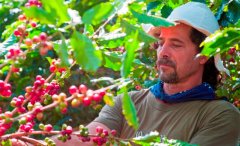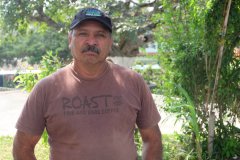Las Haras, Costa Rica, baking degree and flavor of hand-picked coffee beans 100% Arabica
The growing environment of Costa Rican coffee beans:
Costa Rica, with its high altitude, fertile volcanic soil, warm temperature, stable rainfall and tropical climate, is producing high quality coffee beans with excellent aroma and flavor.

The aspect has a unique advantage. Arabica coffee beans come from delicate plants and require specific climatic conditions to thrive, including high elevations and mild temperatures. In Costa Rica, the mountains and warm climate provide the perfect environment for growing the highest quality Arabica coffee beans.
Costa Rica has only two seasons: the dry season and the rainy season, both of which provide an ideal climate for coffee growth. The annual temperature varies only about 10 degrees between 17 and 28 °C (63 to 80 °F). More than 80 per cent of the most popular coffee growing areas are located between 8-1600 m (2624-3280 ft), with an average rainfall of 2000-3000 mm (78-118 inches).
Heavy rainfall and high elevations create ideal farmland and amazing backgrounds for our country. More than 70% of our coffee grows in mountainous areas with great differences in altitude. All these factors will affect the aroma, mellow, flavor and acidity of the coffee produced. The soil is rich in volcanic ash, which oxygenates beans and gives them a richer flavor. The diversity and beauty of our natural climate make Costa Rica an ideal place to live, visit and grow coffee.
The red honey coffee beans in the Las Halas estate in the central valley of Costa Rica are close to the central volcano not far from the capital, with an annual coffee content of about 55200 kilograms at an altitude of about 1250-1500 meters. The manor is one of the most popular estates for coffee lovers all over the world.
Qianjie chose to roast this coffee at a relatively low temperature into the beans, a piece of baking to run the curve, the set degree of baking is moderate roasting, to show the solid and sticky taste of honey treatment. When it is hot, the flavor of chocolate and caramel will appear when sipping, and the acidity of nectarine and green grape will be sipped under the change of temperature.

100% Arabica coffee beans:
In fact, Costa Rica is the only country in the world that bans the production of any Arabica coffee beans below 100% (the highest quality). Arabica beans are one of the most difficult coffee beans to grow, but the result is richer, better quality coffee.
Hand-picked beans:
In order to produce delicious coffee, Costa Rican coffee beans are picked by hand. Only the most mature beans are selected and processed by professionals.
Shoddy coffee is actually illegal (coffee cold knowledge)
Costa Rica is the only country in the world where the production of any type of coffee except 100% Arabica coffee (the highest quality coffee beans) is virtually illegal. A law was passed in 1989 prohibiting the cultivation of shoddy beans and encouraging Costa Rican farmers to pursue true excellence.
Arabica coffee beans are a special kind of beans that are harder to grow than other more hardy stocks. The result of ripening beans is a rich, full-bodied flavor, resulting in a high-quality mixture. In Costa Rica, we attach great importance to growing coffee, so we just want to provide you with the best. That's why we only grow Arabica coffee.
Good beans are actually good for the environment:
When you visit our country or enjoy our mixture at home, you can rest assured that you will not cause wasteful or harmful agricultural practices. Costa Rica has laws to protect 21 per cent of its land, which is just one of the ways in which our country is committed to protecting the planet.
Costa Rican culture encourages local people to love their land and protect the beautiful habitat we have. Our commitment to sustainable and ethical growth practices is justified. The way we grow coffee beans is better for the planet and for our farmers, and produces the best coffee in the world.
Important Notice :
前街咖啡 FrontStreet Coffee has moved to new addredd:
FrontStreet Coffee Address: 315,Donghua East Road,GuangZhou
Tel:020 38364473
- Prev

Introduction to the characteristics of manor honey treatment in Costa Rica coffee producing area what is the flavor and taste quality of Costa Rican coffee beans
You have heard of Costa Rica's wildlife, lush rainforests and amazing beaches, all of which make it famous all over the world. However, there is another reason to add Costa Rica to your travel list: coffee. In addition to winning famous awards in international competitions, Costa Rican coffee has
- Next

El Salvador COE Competition Champion Coffee Bean Manor Podosi History Story Olive Tree Manor Introduction
The coffee industry is crucial to El Salvador's economic growth and is a catalyst for road and rail construction. Although it is less important to today's economy, coffee remains one of its signature crops. Coffee plantations account for 12 per cent of El Salvador's arable land and employ approximately 135,000 workers. Front Street is here to share with you the first coffee plantations from El Salvador.
Related
- Detailed explanation of Jadeite planting Land in Panamanian Jadeite Manor introduction to the grading system of Jadeite competitive bidding, Red bid, Green bid and Rose Summer
- Story of Coffee planting in Brenka region of Costa Rica Stonehenge Manor anaerobic heavy honey treatment of flavor mouth
- What's on the barrel of Blue Mountain Coffee beans?
- Can American coffee also pull flowers? How to use hot American style to pull out a good-looking pattern?
- Can you make a cold extract with coffee beans? What is the right proportion for cold-extracted coffee formula?
- Indonesian PWN Gold Mandrine Coffee Origin Features Flavor How to Chong? Mandolin coffee is American.
- A brief introduction to the flavor characteristics of Brazilian yellow bourbon coffee beans
- What is the effect of different water quality on the flavor of cold-extracted coffee? What kind of water is best for brewing coffee?
- Why do you think of Rose Summer whenever you mention Panamanian coffee?
- Introduction to the characteristics of authentic blue mountain coffee bean producing areas? What is the CIB Coffee Authority in Jamaica?

